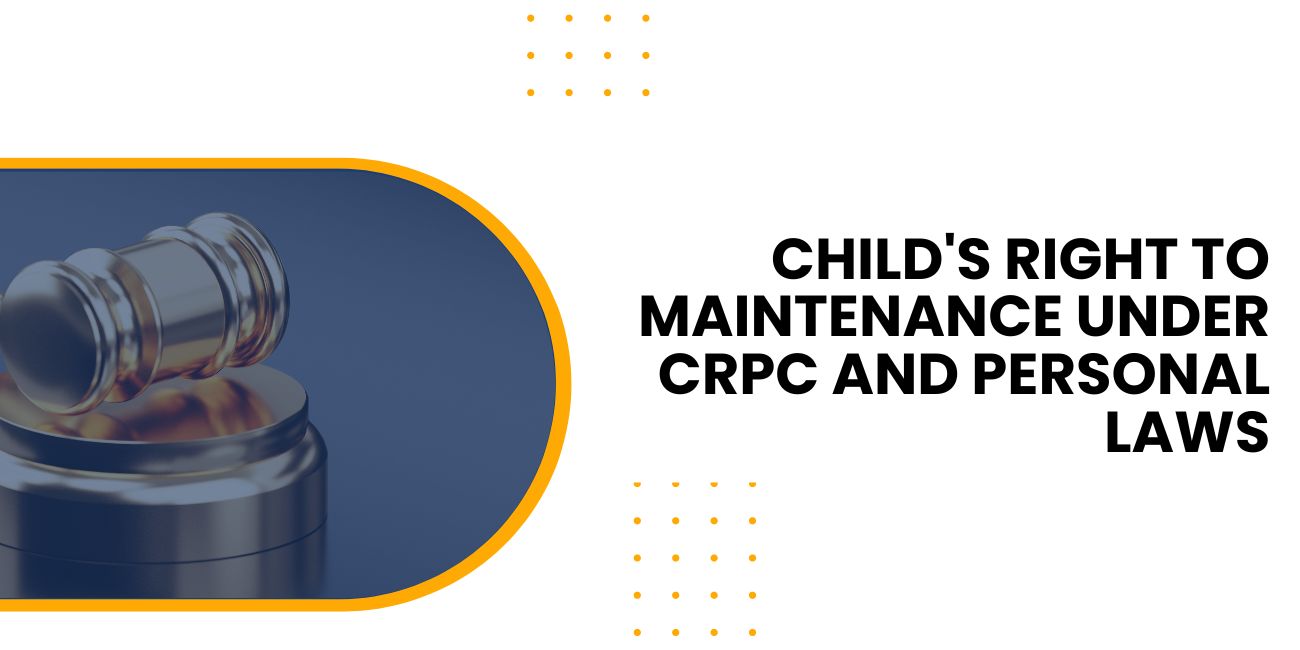
Child maintenance is a crucial aspect of family law that aims to ensure children’s well-being and proper upbringing. Both the Criminal Procedure Code (CrPC) and personal laws in India recognize and enforce the right to maintenance for children. These provisions play a vital role in safeguarding the interests of children and ensuring their access to basic necessities and a suitable standard of living.
Child’s Right to Maintenance under CrPC:
The CrPC, through Section 125, provides a mechanism for children to claim maintenance from their parents. This provision allows any legitimate or illegitimate child who is unable to maintain themselves due to their parents’ neglect or refusal to provide support, to approach the Magistrate’s Court for an order of maintenance. The aim is to ensure that children are not left destitute or without proper care.
The CrPC’s provision for child maintenance applies irrespective of the child’s religion, caste, or community. It emphasizes the welfare of the child as the paramount consideration. The amount of maintenance is determined based on the child’s needs, the parent’s financial capacity, and other relevant circumstances.
Child’s Right to Maintenance under Personal Laws:
In addition to the CrPC, various personal laws also address the issue of child maintenance. These laws differ based on the religion or community to which the parties belong. For example, the Hindu Adoption and Maintenance Act, the Muslim Personal Law, and the Christian Personal Law contain provisions related to child maintenance.
Under these personal laws, parents have a legal obligation to provide financial support to their children until they attain a certain age or status. The specific provisions may vary, but the core principle remains the same: parents must ensure the proper upbringing and maintenance of their children.
Balancing the Child’s Welfare and Parental Obligations:
The concept of child maintenance is rooted in the idea that parents have a moral and legal duty to provide for their children. Both the CrPC and personal laws aim to strike a balance between the child’s welfare and the obligations of the parents. They acknowledge that a child’s well-being is of paramount importance and that parents should not shirk their responsibilities towards their children’s upkeep.
In cases of separation, divorce, or abandonment, these provisions act as a safety net, ensuring that children are not left without essential resources. By mandating the payment of maintenance, these laws contribute to reducing the economic vulnerability of children and allowing them to grow in a supportive environment.
Conclusion:
Child’s right to maintenance under the CrPC and personal laws underscores the commitment of Indian legal frameworks to prioritize the welfare of children. These provisions emphasize that parents’ responsibilities towards their children extend beyond their marital status or religious affiliations. By ensuring access to essential resources, child maintenance laws play a pivotal role in fostering a just and compassionate society that places the best interests of children at the forefront.
If you want to be a judicial officer and are looking for RJS coaching in Jaipur, here, at Jyoti Judiciary we provide comprehensive study material to make your preparation solidified and top-notch. From preliminary mock tests to mains answer writing sessions every material required for clearing the exam is provided. We have separate legal current affairs classes, legal general knowledge, and current affairs classes all in one-time enrolment. Hurry up.









